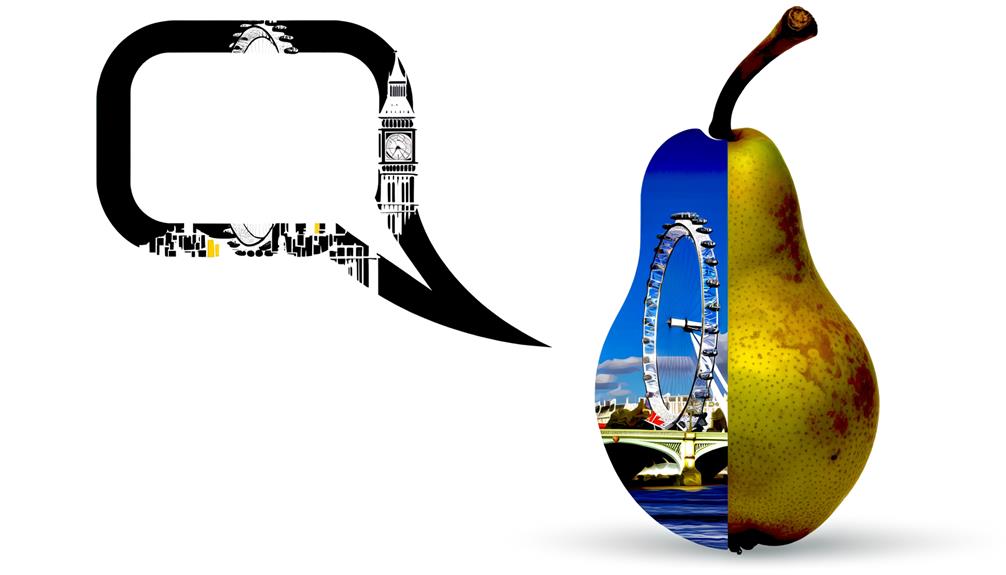In British slang, if you say things have gone "pear-shaped," you're not talking about fruit, but signaling that situations have spiraled disastrously off course. This phrase, deeply rooted in aviation jargon, captures scenarios defying expectations – typically for the worse. Its widespread use across Britain illustrates how language dynamically evolves, painting a vivid picture of plans unraveling in both comedic and tragic hues. From personal mishaps to professional blunders, "pear-shaped" comfortably fits a variety of contexts, embodying the unpredictability of life itself. With its origins as colorful as its applications, this phrase enriches your understanding of British slang's rich, evolving landscape.
Key Takeaways
- 'Pear-shaped' in British slang means a situation has gone wrong or deviated from the plan.
- It originated from aviation jargon, symbolizing plans taking an unexpected downturn.
- The phrase is widely used across the UK to describe both personal and professional mishaps.
- Regional variations exist, but the core meaning remains consistent throughout Britain.
- 'Pear-shaped' has gained popularity beyond the UK, reflecting British humor in global contexts.
Origins of "Pear-Shaped"
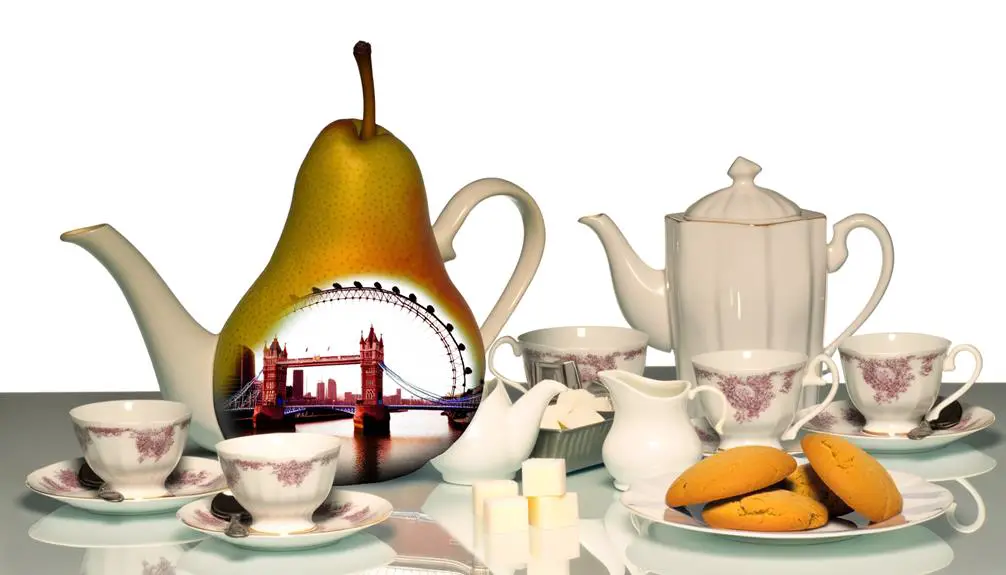
The phrase 'pear-shaped' in British slang, believed to have originated from the aviation world, signifies when plans go awry or situations take a turn for the worse. Diving into the rich tapestry of aviation history provides insights into how this phrase might've taken flight. It's a fascinating journey through time, highlighting the colloquial evolution of language within specific professional domains before spilling into the broader vernacular.
In the domain of aviation, precision and accuracy aren't just goals; they're imperatives. Early aviators, pushing the boundaries of what was possible, often found themselves in unpredictable and precarious situations. The theory goes that 'going pear-shaped' could have referred to an airplane's flight path deviating disastrously from its intended course, perhaps resembling the asymmetrical shape of a pear, rather than maintaining a smooth, circular trajectory during maneuvers. This specific imagery captures the essence of plans not just failing but morphing into a state of disarray, emblematic of the inherent risks in early flight.
As you examine the colloquial evolution of 'pear-shaped', it becomes clear that its transfer from aviation jargon to mainstream British slang is a reflection of the dynamic nature of language. Words and phrases evolve, adopting new meanings and contexts, influenced by the changing landscapes they inhabit. This transformation from a term possibly rooted in the technicalities of aviation to a widely understood expression of misfortune showcases the fluidity of linguistic exchange between specialized fields and everyday conversation.
Understanding this phrase's origin offers a glimpse into not just the history of aviation but also the mechanisms through which language evolves, reflecting the interconnectedness of human experiences across different spheres of life.
Understanding British Slang
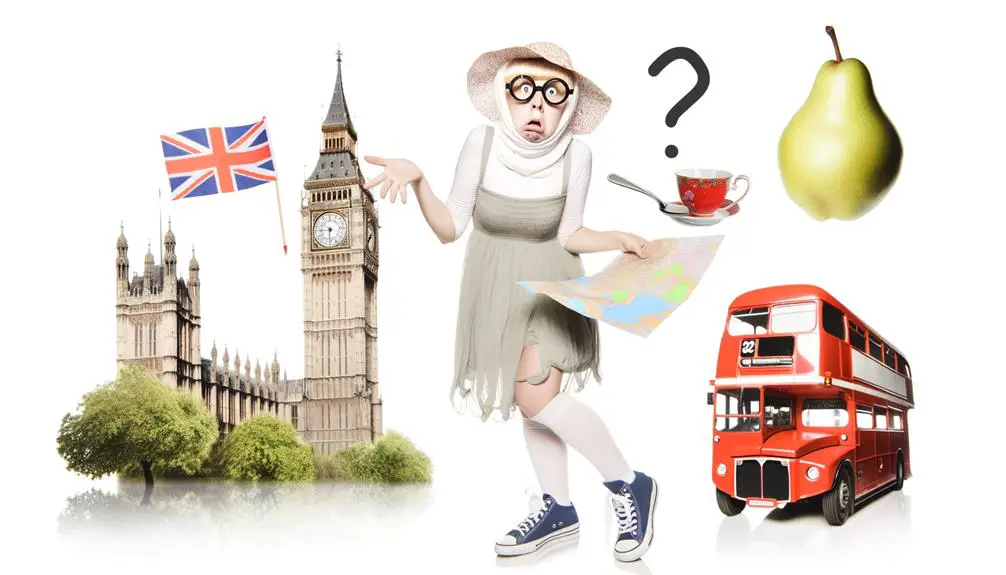
Exploring British slang, you'll find that 'pear-shaped' is just one example of how expressive and nuanced the language can be, reflecting a wide array of experiences and sentiments. As you investigate further, it becomes apparent how British slang isn't static; it's subject to continuous language evolution. This dynamism in slang reflects broader shifts in society, technology, and culture, showcasing the adaptability and creativity of speakers.
Understanding this evolving linguistic landscape requires recognizing the role of regional differences within the UK. Slang that's prevalent in one area may not be comprehended in another, highlighting the rich tapestry of local identities that influence the overall lexicon. This diversity within a single language underscores the complexity of British slang and its capacity to convey subtle nuances of meaning, attitude, and context.
Moreover, international perceptions of British slang often fluctuate between fascination and bewilderment. For non-British speakers, the charm of British slang lies in its uniqueness and the window it offers into British culture and humor. However, this fascination is frequently coupled with the challenge of maneuvering its intricacies without misunderstanding or misinterpreting the intentions behind the words.
In essence, British slang, with terms like 'pear-shaped', serves as a vibrant indicator of language evolution and a proof to the linguistic creativity that characterizes human communication. Its study offers not just insights into the mechanics of slang, but also into the cultural, social, and international dynamics that shape and are shaped by the way we speak.
Common Uses in Conversation

In everyday conversations, you'll often hear 'pear-shaped' used to describe situations that have gone awry, highlighting its prevalence in British slang. This phrase succinctly captures the essence of plans or expectations that haven't only failed but devolved in an unexpected or humorous manner. It's a sign of the British penchant for understatement and dry humor, even in the face of disappointment or disaster.
When analyzing its common uses, you'll find that 'pear-shaped' frequently surfaces in discussions about personal endeavors or professional projects. For instance, someone might recount an attempt at a home renovation that went pear-shaped when unexpected structural issues were discovered. Here, the phrase encapsulates not just the failure but the cascading effect of problems that ensued, providing a rich narrative in just two words.
Moreover, it's remarkable how 'pear-shaped' can carry positive spins despite its negative roots. In the resilient spirit of finding silver linings, speakers often use it to segue into what was learned from the experience or how it led to an unforeseen opportunity. “The whole event went pear-shaped, but we ended up discovering a fantastic new venue,” is a prime example of this optimistic reframing. It's a linguistic maneuver that acknowledges the failure examples while steering the conversation towards resilience and adaptability.
Thus, 'pear-shaped' in British slang serves not just as a sign of failure but as a launchpad for storytelling, reflection, and, sometimes, unexpected positivity. Its versatile usage in conversation reveals much about the cultural attitudes towards mishaps and the ability to laugh at oneself.
Variations Across the UK
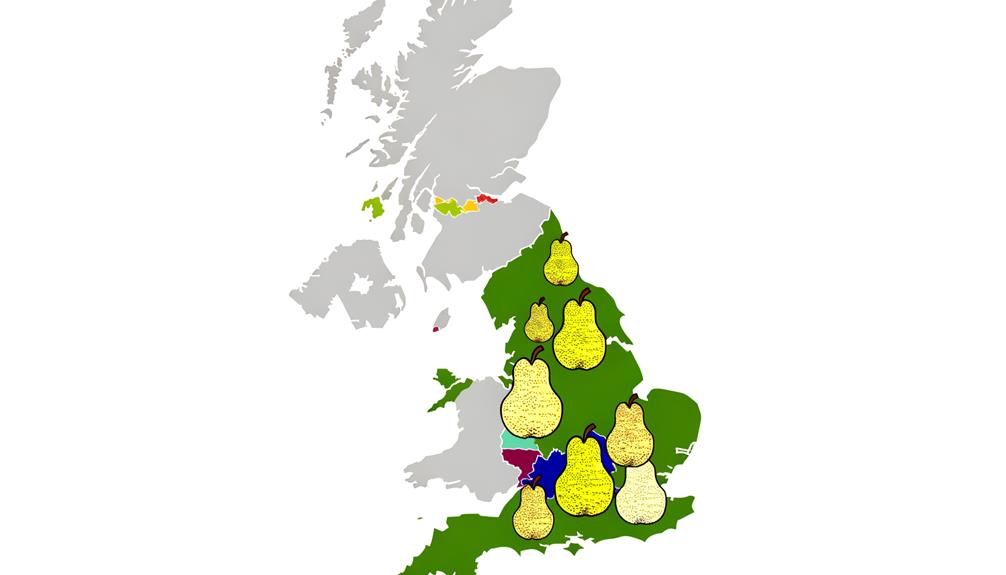
While discussing the common uses of 'pear-shaped' in British slang, it's intriguing to note how its interpretation and application can vary considerably across different regions of the UK. This diversity in usage underscores the rich tapestry of British regional identities and highlights how slang evolution isn't a confirmation but rather a patchwork of local variations and nuances.
In some parts of England, 'pear-shaped' might primarily denote a situation that has gone awry, aligning closely with the general understanding of the phrase. However, venture into other regions, and you'll discover that its connotation can shift slightly, perhaps emphasizing the severity of the mishap or even, in rarer instances, adopting a more humorous or ironic tone. This fluidity in meaning isn't just about geographic differences; it's also reflective of socio-cultural contexts that influence how language is used and understood locally.
Scotland and Wales, with their distinct linguistic and cultural landscapes, further enrich the slang's regional interpretations. In these areas, 'pear-shaped' can be infused with local idiomatic expressions, giving it a flavor unique to those communities. This blending of slang terms across the UK is a demonstration of the dynamic nature of language, showcasing how expressions evolve and adapt in response to changing societal influences and interactions.
Understanding these regional variations isn't just an academic exercise; it offers a fascinating glimpse into the day-to-day linguistic creativity and adaptability of people across the UK. The evolution of 'pear-shaped' and its differing regional interpretations serve as a microcosm of the broader dynamics of slang evolution, illustrating how language is an ever-changing entity shaped by the people who use it.
Cultural Impact and Popularity
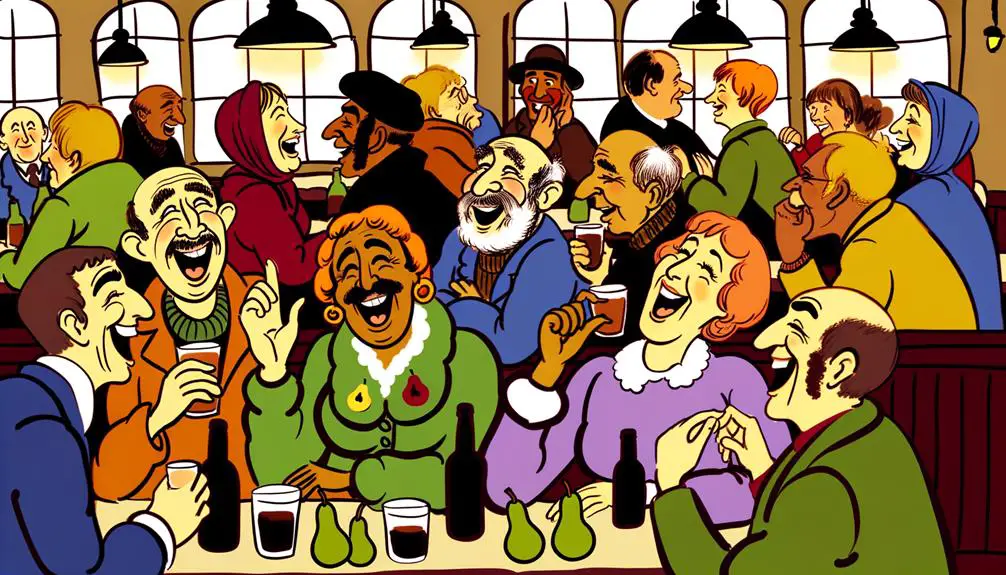
The cultural impact and popularity of the phrase 'pear-shaped' in British slang significantly reflect the dynamic nature of language as it permeates various aspects of society. This expression, illustrating when plans go awry, showcases the fascinating process of language evolution. It's a confirmation of how specific phrases can capture the collective imagination and, in turn, influence dialogue across generations.
You've probably noticed how the phrase has transcended regional boundaries within the UK, becoming a staple in the lexicon far beyond its origins. This widespread acceptance underscores the fluidity of language and its ability to adapt and thrive in different settings. What's particularly intriguing is the global spread of 'pear-shaped.' As British media and entertainment gain international audiences, such idiomatic expressions hitch a ride, embedding themselves in the vocabulary of non-native speakers. This cross-cultural exchange enriches language, offering a glimpse into the nuances of British humor and sensibility.
The impact of 'pear-shaped' extends into various media, from TV shows where characters lament their misfortunes with a cheeky, 'It's all gone pear-shaped,' to literature and social media platforms, where it's used both humorously and in earnest. This broad usage signals not just the phrase's versatility but also its ability to resonate with a wide audience, highlighting shared experiences of plans not going according to plan.
Understanding the popularity of 'pear-shaped' in British slang, you're witnessing the ongoing story of language evolution. It's a reminder of how expressions can gain significance, weaving themselves into the fabric of cultural identity and conversation, both within the UK and globally.
Frequently Asked Questions
How Does the American Interpretation of 'Pear-Shaped' Differ From the British Slang Meaning?
You're exploring how 'pear-shaped' is understood differently across the Atlantic. While its etymology originates in British slang, where it means something's gone wrong, Americans mightn't grasp its full nuance.
This linguistic comparison sheds light on how phrases evolve and migrate. Understanding these differences not only enriches your vocabulary but also offers insights into cultural perceptions and the fluid nature of language.
It's a fascinating delve into the subtleties of English's global variations.
Can 'Pear-Shaped' Be Considered Offensive or Derogatory in Any Specific Contexts or Cultures?
In certain contexts or cultures, phrases can be offensive or derogatory, reflecting cultural sensitivity and language evolution. When you're exploring different cultural landscapes, it's vital to understand how seemingly benign terms might carry negative connotations.
The expression 'pear-shaped,' while generally humorous or light-hearted, could be misunderstood or seen as derogatory in specific settings. It's a reminder of the importance of being aware of linguistic nuances and respecting cultural sensitivities.
Are There Any Notable Public Figures or Celebrities Who Have Popularized the Term 'Pear-Shaped' in Recent Years?
You're diving deep into the world of phrases, where 'pear-shaped' has caused a stir. While no single celebrity has famously championed this term, its use has trickled through media, subtly endorsed by public figures amidst controversies.
It's a confirmation of how language evolves, shaped by the mouths of those in the spotlight. Celebrity endorsements, even in passing, can amplify a phrase's popularity, embedding it deeper into our cultural lexicon.
How Has the Digital Age and Social Media Influenced the Use and Spread of the Term 'Pear-Shaped' Globally?
In the digital age, you've seen global trends and language evolution unfold rapidly, thanks to social media's reach.
The term 'pear-shaped' has spread worldwide, transcending its British origins.
You're witnessing how platforms like Twitter, Instagram, and TikTok not only popularize slang but also facilitate its evolution.
This global stage has turned local phrases into international vernacular, showcasing how digital connectivity shapes contemporary language and cultural exchange.
In Literature or Film, Can You Provide Examples Where 'Pear-Shaped' Has Been Used in a Way That Significantly Contributes to Character Development or Plot Progression?
You've seen it in movies and read it in books, where a perfectly laid plan goes awry, mirroring life's unpredictability. 'Pear-shaped' captures these moments, adding depth to character development and plot twists. It highlights character flaws, showing how they navigate through chaos.
This expression, subtly woven into narratives, enriches the story, making characters more relatable and the plot more gripping. It's a confirmation of the power of language in storytelling.
Conclusion
In sum, delving into the heart of British slang, you've unveiled the quirky origins and uses of 'pear-shaped.' This phrase, a tribute to the rich tapestry of UK dialects, paints a vivid picture of plans gone awry.
It's as if you're exploring the unpredictable British weather—sunny intentions quickly clouded by unforeseen storms. Across conversations and regions, its popularity underscores the cultural fabric it weaves, making it an indispensable part of the British lexicon.

